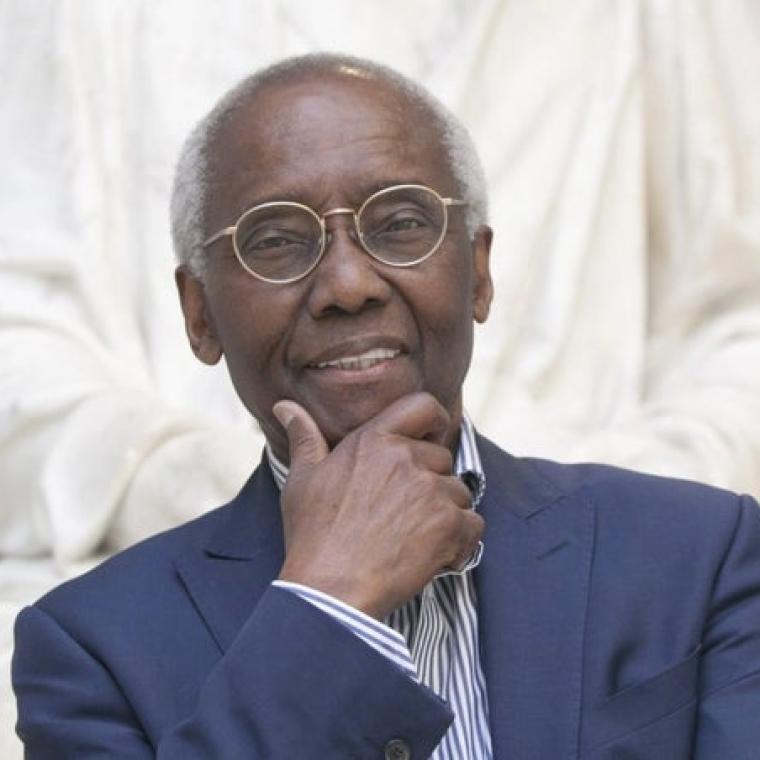Marketing Society Director Graeme Atha welcomed Sir Geoff Palmer under the spotlight to discuss how being honest about the ways Scotland benefitted from the slave trade is an important step to becoming a fair and inclusive society.
Sir Geoff Palmer OBE is a Professor Emeritus in the School of Life Sciences at Heriot-Watt University in Edinburgh, and a long-time human rights activist. He spoke candidly about his experiences as a member of the Windrush generation, his pioneering work in the brewing industry, and Scotland’s relationship with the slave trade.
As someone with an obvious gift for storytelling, the personal experiences Sir Geoff shared were vivid. From his aunt wrapping him in newspaper under his shirt to keep him warm on his long trip from Jamaica to Liverpool aged 14, to the recent receptionist who said he couldn’t possibly be the 2pm speaker “as that’s Professor Geoff Palmer”.
We have Sir Geoff and his students to thank for many of our best loved brands from Brewdog to Stewart Brewing. But Sir Geoff’s legendary status within the brewing industry stems from his discovery of the ‘Barley Abrasion Process’ which involves deliberately damaging the protective husk of grains – as a way of speeding-up the process of malting. His talk suggested a similar ‘abrasion process’ may be required to tackle racism. A process where we shed a little of our own protective husk and think uncomfortably on Scotland’s slave-trading history – if we’re to speed-up progress to a more equitable society.
Sir Geoff outlined four areas where we might benefit from being more ‘usefully uncomfortable’.
Scotland’s historical narrative
He talked about Scotland’s links to the Caribbean chattel slave trade, and the wealth and power accrued from that over generations. In particular he highlighted the self-serving myth we’ve constructed as a country where we prefer to talk about Scotland’s role in the abolition of the slave trade, than to admit Scotland’s deep involvement, (and the consequences this has had on modern day racism and inequality).
Education
Sir Geoff shared his strong view that “education removes ignorance”, but reported frustration at the difficulty opening a discussion around changes to the school curriculum, (and a feeling from some quarters that it wasn’t helpful to make children “feel guilty” about Scotland’s past). He asked any of us in the marketing industry with influence in education spheres to help make the case for changing the curriculum in Scotland, as a step towards becoming a more fair and inclusive society.
Statues
Asked about the removal of statues linked to the slave trade, Sir Geoff shared his strong view that if we take statues down people will forget. He talked about his long (often frustrating) role in developing a new permanent plaque for the statue to Henry Dundas in St Andrew’s Square which acknowledges the hidden history of Dundas’ role in delaying the abolition of the slave trade. A poll showed 87% of those on the webinar supported updating plaques, with just 13% in favour of removing statues altogether.
Reparative justice
He praised the approach taken by Glasgow University to understanding the ways it benefited from the slave trade and committing to a programme of reparative justice. The University discovered it had benefited financially from Scottish slave traders by between £16.7m and £198m in today’s money. It signed an agreement with the University of the West Indies to fund a joint centre for development research and pledged to raise £20m for the centre.
Sir Geoff ended his talk by reflecting on the fact it’s not the scale of the University’s action which is key, it’s the willingness to be honest about the uncomfortable truth, saying “one kindness is enough to remind us that we are one humanity…nothing less.”
Reflections for the marketing industry
Graeme Atha brought the talk to a close by reflecting on the need to recognise and act-on uncomfortable truths within our own industry, particularly the root causes of why we lack ethnic diversity relative to the wider Scottish population.
I came away with a strong feeling that, like Sir Geoff’s barley grains, we may need to allow our comfy protective husks to be chipped-away-at and made uncomfortable, if we are to speed-up the process of real change.
Many of us in the Scottish marketing industry wrestle with what ‘Scottishness’ and ‘Scottish values’ mean for our brands and national image around the world. It’s up to all of us to make sure that if we quote Enlightenment philosophers like Hume (who said black people were an inferior form of human race), or praise the beauty of the Glasgow Museum of Modern Art (built on tobacco wealth linked to the slave trade) – that we’re not perpetuating a collective amnesia and blindness when it comes to Scotland’s more uncomfortable truths.
Useful links
A video of the session is available here.
Twitter: @SirGeoffPalmer
Sir Geoff Palmer’s book “ The Enlightenment Abolished” is available by emailing him direct at [email protected] All profits from book sales go to his church in Jamaica.




